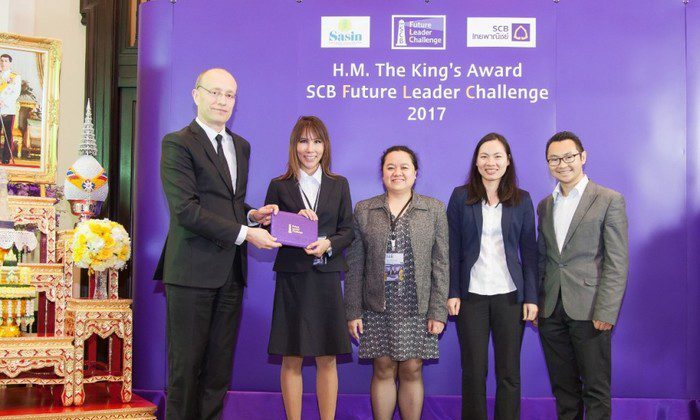GLOBIS continues to make its case one of the top business schools in Asia. Recently, three students and an alumnus represented GLOBIS—the only school from Japan—at a business case competition in Thailand. The team placed first in their group in the five-hour short case competition. Now, as this year’s students start their preparation, they reflect on what made them so successful.
GLOBIS Team:
– Kristine “Jab” Bandayrel, Full-time MBA Class of 2014 (student, from the Philippines)
– Nhan Do, Full-time MBA Class of 2014 (student, from Vietnam)
– Yanuar Kurniawan, Full-time MBA Class of 2015 (alumnus, from Indonesia)
– Naveephij “Peach” Sriruangjib, Full-time MBA Class of 2014 (student, from Thailand)
– Mentor: Megumi Taoka (GLOBIS Faculty, from Japan)
Well, how’d it go?
For the SCB Future Leader Challenge, we first had to apply from Japan and then be selected to go to Thailand. Then there were three “crack the case” competitions: a 99-Second Pitch, a 5-hour Short Case Competition and presentation (which we won!), and a 24-hour Case Competition.
The five-hour case was a market expansion of a social venture that helps farmers in Northern Thailand. The challenges were to create differentiation while still being sustainable. The judges said we were “well-organized and [had] unique presentation slides… using proper business models with a concise presentation flow.” They said our analysis was thoughtful and comprehensive, with a good understanding about the company and the market. In the end, we were able to create a very clear, easy-to-understand explanation. We also did quite well in the Q&A. In short, we won because we had a thorough analysis, and avoided just jumping straight into our conclusions without any basis for them.

Why do you think you were able to succeed?
Overall, GLOBIS helped us a lot. We think we were successful for the following main reasons:
Deep, Comprehensive Analysis
We were able to apply the frameworks and analyses that we use in class: the five whys, thinking in both the short-term and long-term, and creating an overall strategy. The globalization classes and frameworks helped us decide how to balance local and global challenges while creating synergies. Also, by simply doing a one-year MBA, we knew a lot more about business (and frameworks) than our competitors doing two-year MBAs.
GLOBIS Class Style
We use the case method in literally every case we do, and the way this helped prepare us cannot be underestimated. Cases are based on real life, and they provide a practical view that helps solve real-world problems. We were more familiar with the case method than other schools, which tend to have more lectures and exams, rather than GLOBIS, which has cases based on group work, presentations, and reports. We were much more proactive in asking questions than other schools, as the GLOBIS style has trained us. Finally, we were used to the time pressure and had good time management (we even scheduled our meals and sleep time!). Quite simply, we’ve been trained to crack cases in a short amount of time.

Diversity—But Not In The Way You Are Thinking About
We come from four countries in Southeast Asia (more diverse than other teams), and our geographical diversity helped us to understand Thailand as well as how to think about international expansion. Also, our industry diversity inspired us to apply insights from the coffee market with the energy drink market, for example, in the final competition. However, our diversity of skills and expertise was probably our greatest asset. We had experts in HR, finance, overall strategy, and, perhaps importantly, presentation. (Next, time, we might need a marketing person!) We were able to work to our unique strengths and cover each other’s weaknesses.
Kokorozashi—Personal Mission and Contribution to Society
Our training and understanding of Personal Mission helped us understand the social and intrinsic value of the company, and we were very clear to acknowledge this during our presentation. By understanding the true value of the company—not just profit—we took into account the value of the different stakeholders and included them in our marketing strategy, which did not go unnoticed by the judges.

Our Unique Presentation Style: Using the Whiteboard!
GLOBIS faculty and students always use the whiteboard when communicating, to help visualize the situation, and we used that in our presentation (most other groups just used PowerPoints). This was unique, and it helped the audience (the judges) understand the situation more easily. The Business Presentation course was great preparation for this competition!
How will you apply this experience to your life beyond school?
Through this event, we realized the following:
– Case studies can teach us how to tackle real challenges.
– This one-year, intense MBA and time pressure helps us handle stress better: just take it step-by-step.
– Our presentation skills have improved. We are “branding” our slides and creating effective storylines, as well as working on our delivery. It really affects our appearance and efficacy.
– The core courses, especially Critical Thinking and Strategy, have really helped us have an understanding of the basis of business.
Most of these realizations were nothing especially new. Rather it was more that we confirmed that what we had been learning all along was so right. We learned the true value of our MBA and the effectiveness of our GLOBIS education.




